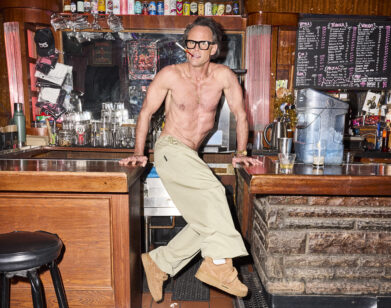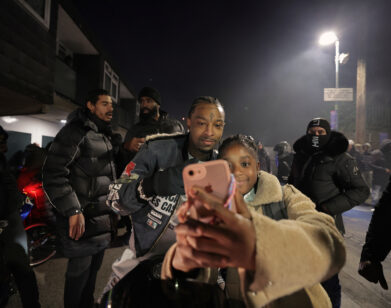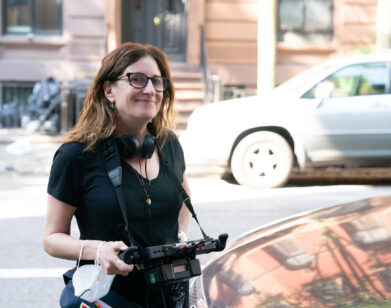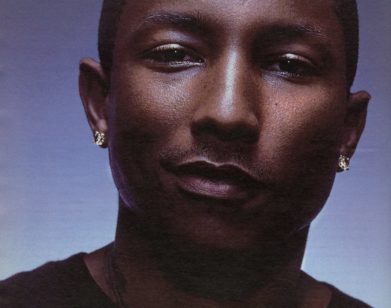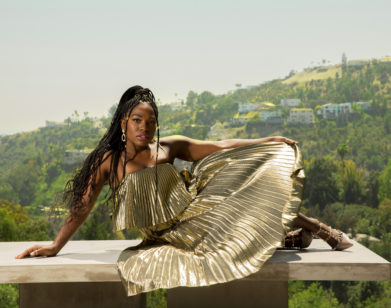in conversation
Quinta Brunson and Seth Rogen on the Agony of Writing Books
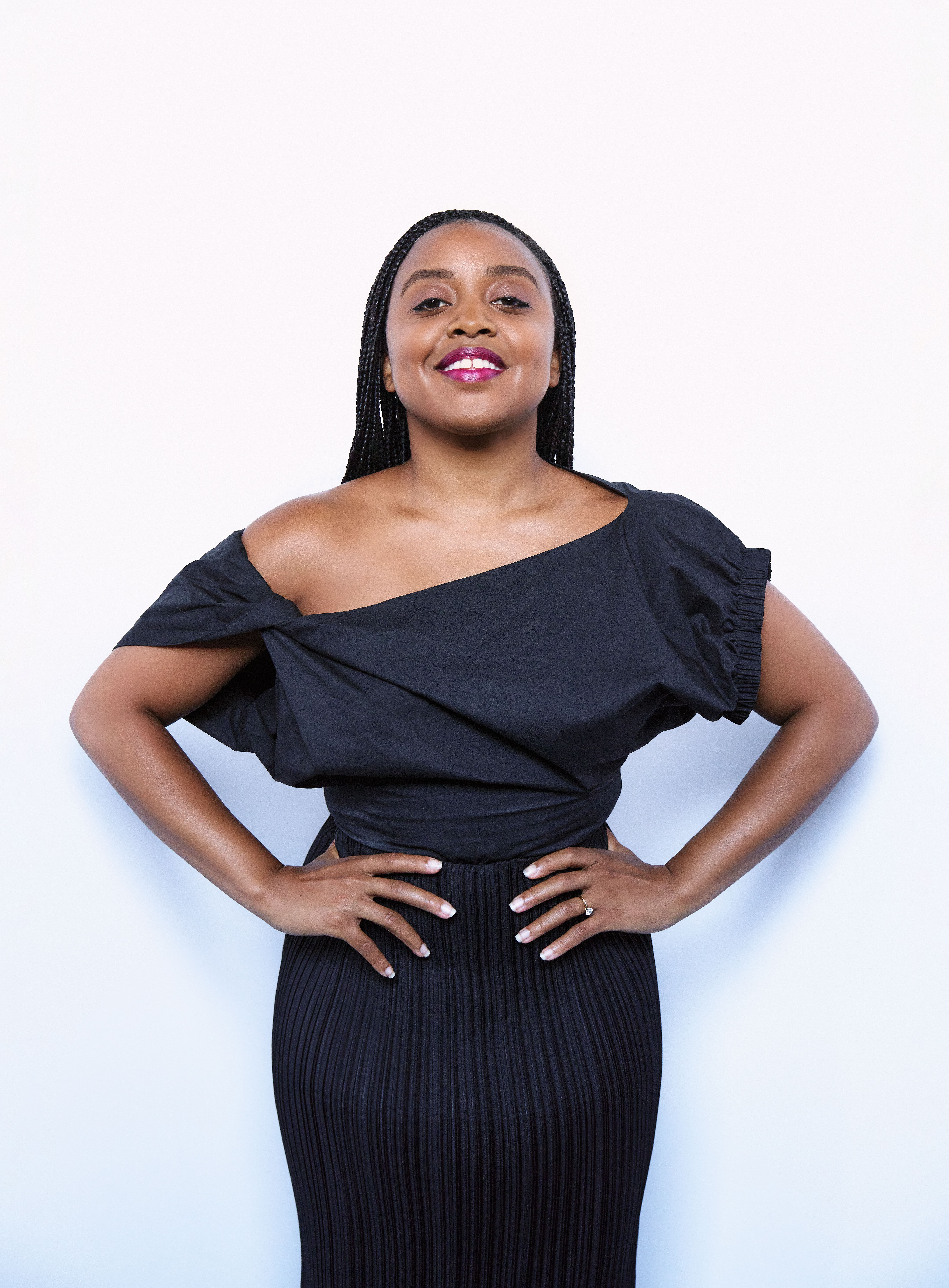
All photos by the Riker Brothers.
Quinta Brunson, an early pioneer of internet virality and queen of the web-tailored comedy show, is embracing a new medium—or rather, the oldest one there is. With the release of She Memes Well, a book of lighthearted and gripping essays that stare down all sides of the media world and interrogate Brunson’s place within it, the 31-year-old comedian has given us yet another reason to entrust her with our limited attention spans. The book charts her (relatively speedy) journey from West Philly comedy nerd to star of HBO’s A Black Lady Sketch Show, and traces the tensions between her successes as a producer at Buzzfeed and the struggle to reconcile with depression and family trauma, offering readers a glimpse behind the curtain of one contemporary comedy’s most dynamic minds. But how hard is it to transition from Instagram Stories to hardcover tomes? Below, the girl who launched a thousand memes tells Seth Rogen about her love-hate relationship with the writing process.
———
QUINTA BRUNSON: So Seth, you’ve done one of these before?
SETH ROGEN: I think I’ve interviewed maybe three or four people for Interview.
QUINTA BRUNSON: Oh, so you work here?
ROGEN: I do. I interviewed 21 Savage one time. I interviewed Danny McBride, and I think I was interviewed one time by Nick Kroll? I honestly can’t remember. Are you on a wild virtual book promotion tour right now?
BRUNSON: Yep, it’s all virtual which I like because I didn’t really want to do a book tour anyway.
ROGEN: No, me either. It was the thing I was most afraid of, I think. They really made it out to be a big thing.
BRUNSON: I have a lot of issues with traveling by myself to places.
ROGEN: Oh yeah. I don’t want to do that at all. Meeting people and shaking thousands of hands over and over and over again.
BRUNSON: I want people to keep the version of me that they see in their heads.
ROGEN: Exactly. A much more curated version of you. I’m warning you now that at some point my wife is going to bring the dog in here. So how has the book promotion been going?
BRUNSON: It’s been interesting. It’s really nice to see people getting exactly what I intended to be gotten out of the book. That’s a really nice feeling. It feels like it makes it all worth it. The book process was very difficult for me.
ROGEN: How long ago did you start working on it?
BRUNSON: Three years ago.
ROGEN: You probably got a lot of what I did where people said to you, “You wrote a book over quarantine?” And it was like, “No! I’ve been fucking working on this shit for fucking years.”
BRUNSON: I keep saying that it was the hardest thing I’ve ever done.
ROGEN: What made you want to do it in the first place?
BRUNSON: If I can be honest with you, I did not really want to do it in the first place. I was approached.
ROGEN: Great. Did you ever want to do it?
BRUNSON: I think that’s one of those things I’m not supposed to say but it’s the truth, where I was approached when I was leaving my job at Buzzfeed and they were like, “We think this would be cool,” and I was like, “I really don’t think I have anything to say yet.” I didn’t feel like I did. The publisher came up with the idea, or the book agent, or whatever.
ROGEN: Really?
BRUNSON: Yeah, they were like, “Well, your journey through digital media has been interesting,” and I was like, “All right, well that’s something. I can talk about that.” I didn’t want to tell people what to do and that’s what a lot of books seem like to me. A lot of the books that were coming out, they were like, “And here’s how you live your life,” which wasn’t fair. Once I started it though I got into it because I saw that I did have things to say.
ROGEN: People put a lot of importance on books, but some of the dumbest motherfuckers in history have written books. Popular books.
BRUNSON: It’s true, I guess I have a deep respect for books.
ROGEN: I think people have too much respect for books, maybe.
BRUNSON: I think people have too much respect for TV.
ROGEN: Yeah. People have too much respect for all of it.
BRUNSON: For all of it. I think I didn’t want to write one because of how much respect I have for books and how much they’ve changed my life, and I was like, “I don’t know…”
ROGEN: While you were afraid to write a book, what were some of the books you were thinking of?
BRUNSON: Tina Fey’s book was like a blueprint for me. It seemed so well done and well curated and she said what she needed to say. It motivated me. Same thing with Mindy Kaling’s book. Both of those were game changers.
ROGEN: You’ve just named two of the ten books I’ve read in my entire life, I think.
BRUNSON: Honestly, David Sedaris has a book that I read when I was going to Second City and his book was really formative for me, and then there were some narrative books like Catcher in the Rye, that was a big one for me.
ROGEN: Really, you liked Catcher in the Rye?
BRUNSON: I loved Catcher in the Rye.
ROGEN: Did you feel surrounded by a bunch of phonies?
BRUNSON: Maybe. I don’t know what it is, it just got me. Also Frindle. It’s about a little boy who decides he wants to change the name of a pen to “frindle.” He does it and he winds up on Jay Leno and “frindle” winds up in the dictionary. He went viral before going viral was a thing. Unbelievable book. Also Holes was a good book.
ROGEN: Oh yeah, speaking of ‘canceled.’ Shia LaBeouf, there you go.
BRUNSON: Everything I love! [Laughs]. I want to reserve this space to still love those things.
ROGEN: You should. I think you deserve them. It’s funny, I think it shows that people don’t find art to be a useful thing. If something is considered useful, no one questions for one second whether or not the person who made it was a fucking piece of shit. Henry Ford was a Nazi and no one said, “We shouldn’t use assembly lines anymore.”
BRUNSON: It’s so true. I want to have the room to discuss that something was good at the time, but which we know better about now. I was thinking about that with Tropic Thunder the other day. I want to start a podcast that answers the question “Is Tropic Thunder good?” And that’s it.
ROGEN: [Laughs] I bet that could go on longer than you would think, actually. When did you start to enjoy the process of writing the book?
BRUNSON: I started to enjoy it when I got into probably the saddest chapters of the book. I think there was an expectation for the book to be funny. Sometimes that feels like pressure because when you’re writing they ask you to punch up lines and it’s like, “Well, that’s how I want to say it. I don’t want it to be punchy. I would like to say it the way I did.” But I felt like I had the most freedom in the sadder chapters. There’s a chapter about my little cousin who unfortunately died via gun violence and the publisher backed off and said, “We have no notes for you here.”
ROGEN: “Nope, nothing to add to this one. Don’t want to punch this one up!”
BRUNSON: That felt very free, to be able to talk about something that is unique to me and a lot of other people from Philly specifically.
ROGEN: That totally makes sense. What was it like working with an editor?
BRUNSON: It was a complicated relationship. Was it hard for you or you didn’t have an editor?
ROGEN: Oh, I had an editor. My first editor was laid off halfway throughout the process, and then I got a new editor two thirds of the way through.
BRUNSON: The book world is so different from our world. I thought I knew what I was doing because I saw a couple of episodes of Sex and the City when Carrie writes her book, but I was not prepared.
ROGEN: How did you find it different?
BRUNSON: In TV you get notes on the fictional stories you are writing. It was hard for me to be edited in my book, especially as someone who does stand-up. No one edits my stand-up and I feel like you should just let this shit rock as is. So, I’d turn in a chapter and I’d be like, “This is good. I’m on my art shit,” and they’re like, “We understand, but this is not cohesive.”
ROGEN: Well, that’s a solid note I think.
BRUNSON: Even in your honest writing, it still has to fit the theme. It needs to have the through line and it was hard going through and compiling my life in that way. For me, a lot of shit is a blur. I know it goes from birth to now but I’m like, “I don’t know.” I think of college in such a separate way. I was talking about college randomly toward the beginning of the book and they told me we should build up to that with the way that my book was formatted. I was like, “Why can’t they just take it how they get it?” and they were like, “Because no one’s going to like it.”
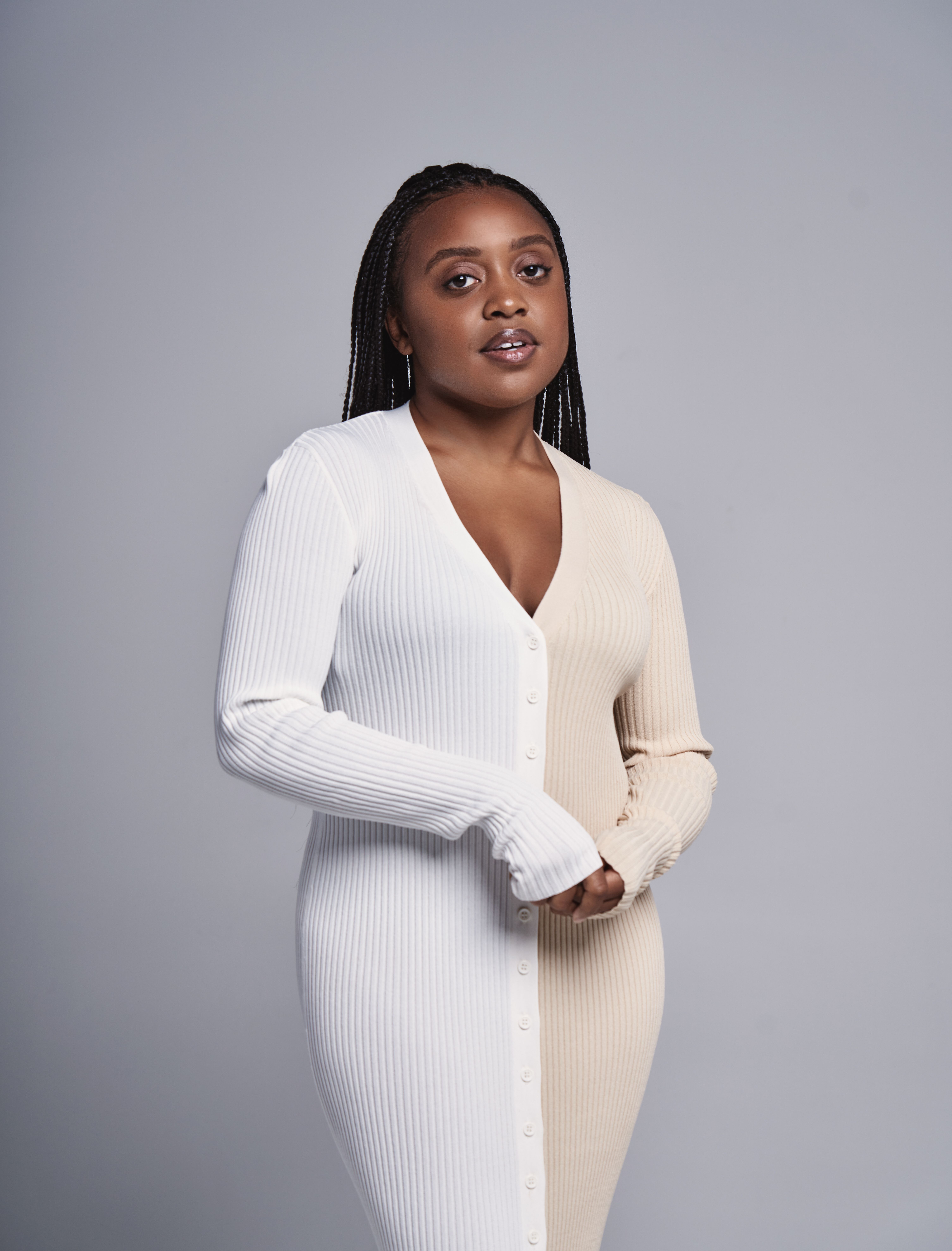
ROGEN: Did you find it hard to physically sit down and write the book? My book took a year and a half later than it was supposed to be because of sheer procrastination.
BRUNSON: Same, I procrastinated like nobody’s business. Sometimes I just didn’t want to do it, sometimes life was happening. While writing this book I was casting a show, I got into a relationship… That was a big thing. A lot of my ideals that I had when I got the book deal at 27 flipped on their heads. I thought I was never going to get married, and then I got engaged.
ROGEN: Had you written a chapter called “Why I Hate Marriage?”
BRUNSON: Kind of. It was like a cute strong principle I had to stand on. I had my little metaphors and everything ready to go and had to throw them out the window. The book process taught me that you really just got to keep it moving. You can have your little fucking quips and your so-called principles to get you through life, but that shit changes, especially during the time I was writing the book from 27 to 30 and I think that’s what made it so hard. I was changing rapidly from day to day.
ROGEN: That totally makes sense. Are there things that you look at since the book has been finished where you’re like, “Yeah, maybe I don’t feel that way anymore”?
BRUNSON: Yep, absolutely. I mean, I wish I didn’t curse so much.
ROGEN: That’s funny.
BRUNSON: I know my mom’s going to be really disappointed, but when I was writing it I wasn’t thinking. I wish I had held back a little on some of those stories.
ROGEN: Yeah, I talk a lot about people in my personal life. What was that like for you?
BRUNSON: That was a mixed bag. My personal life is more complicated than I like to admit but I have a very conservative family. I have a lot of shit in my family. I had to take certain stuff out, like, “Oh man, I can’t put that in there. That might be proof for them to go to jail.”
ROGEN: You don’t want your book to be referred to as “Exhibit A” at any point.
BRUNSON: I really don’t. I had to check with family members I didn’t even know before certain names went in the book. I changed a lot of names. What’s unique about me and what I want to show to younger girls is how I’m good friends with all of my exes and I love the people in my life. I had to communicate with a lot of people and say, “Are you okay with this? I’m going to talk honestly about our relationship.” That part was pretty easy, it was the procrastination that got me. There were times when they told me, “You got to write the book,” and I thought they were crazy, because I had TV shows I was working on.
ROGEN: Exactly, yeah. “No one’s interested in the book if I stop becoming an actor.” Are you performing now?
BRUNSON: I don’t know if I’m going to go back to stand-up.
ROGEN: Yeah. I quit.
BRUNSON: Why did you quit? The pandemic set that in stone for me.
ROGEN: I realized I was largely doing it as a stepping stone, so when I started doing the other things I didn’t feel like I needed it as much. I enjoyed writing scripts and I didn’t love doing stand-up. I didn’t like going out, I didn’t love working at these clubs. I would be surrounded by people who clearly loved it and I would just be like, “I can’t compete with them. They fucking love this shit.” Then I’m on a set, and it’s like “Oh, I’m good at this.” I’d see people on set who’d get exhausted after a few long days, but I can just do it.
BRUNSON: See, that’s how I feel, but I didn’t want to say it out loud. It’s like, “I don’t want to do this anymore. I think I got what I needed to get out of it.” It wasn’t like I was doing it poorly, but I would be at a club at 2 AM like, “I want to go home to my cat and my fiancé.” I realized I don’t like the culture anymore. I didn’t want to be in the clubs anymore and I don’t like when you have to travel. I wonder if I would have ever said it out loud if it weren’t for the pandemic.
ROGEN: Now you can write books and shit. Would you write more books?
BRUNSON: I don’t know. TV feels like home. Now that I’ve sold a show, I finally feel like I made it. Eventually, I would like to make shows that I’m not in. Our girl Mindy did it, and she wrote multiple books. But I think she loves writing. That’s the difference. I don’t think I love this enough, but we’ll see. I can’t believe someone is sitting down and reading from front to back something I wrote. That’s just crazy.
ROGEN: Yeah, it’s super weird. Where are you at with Twitter and the internet now?
BRUNSON: I was off of Twitter in a really healthy way until yesterday.
ROGEN: Really? For how long?
BRUNSON: For weeks. It’s too many opinions coming at me about too many random things. It was becoming overwhelming and it was affecting my psyche. I think it’s affecting everyone’s psyche. What about you?
ROGEN: It’s a complicated thing. I like to know what’s going on. I feel like, especially part of being a comedian is to be hyper-culturally aware. It’s funny because Evan [Goldberg, Rogen’s writing partner] is not really on social media and there’s been so many times when I’m telling him about a thing and I’m just like, “Oh, if neither of us knew about this that would be bad.”
BRUNSON: I hate that though. I feel like I need a Seth to my future Evan.
ROGEN: Exactly, you just need someone to do it for you.
BRUNSON: Your pottery is a social media sensation. I would accept if you were an excellent dancer but something about you being that good at pottery is honestly, why?
ROGEN: I wish I could sing. I would trade it for singing.
BRUNSON: If I could sing and I had a big butt, I’d be a bad bitch in an instant. Get me out of here. Your pottery has inspired me to follow a hobby. I’m trying to figure out how to get it off the ground but I really love watching YouTube videos of amusement park rides.
ROGEN: From the point of view of the person on the ride?
BRUNSON: I’m thinking about doing my own channel, but it won’t be my face, it’ll just be my hobby because I think sometimes that I could provide a good experience for people who can’t come to Universal Studios.
ROGEN: Dude, that’s a good idea. You just strap a GoPro on your head and go on rides and comment on them. I once conceived of a play about a bunch of people stuck on a ride and it was because once I was on the Jurassic Park ride and we got stuck for 45 minutes. Some people were fucking losing it, some people were just calm, some were already arguing when we got on the ride.
BRUNSON: I got stuck on Superman at Six Flags like that.
ROGEN: Were you vertical?
BRUNSON: Yeah, we were vertical and I was on it with a guy that I was seeing at the time, and we were kind of having these conversations like, “What are we to each other?” on this ride because there was nothing else to do but face the ground and face our fear really and talk about this. I think I will start a separate Twitter account where I can truly talk about my love of rides.
ROGEN: Well I think you just uncovered what your second book could be about as well.
BRUNSON: Please.

